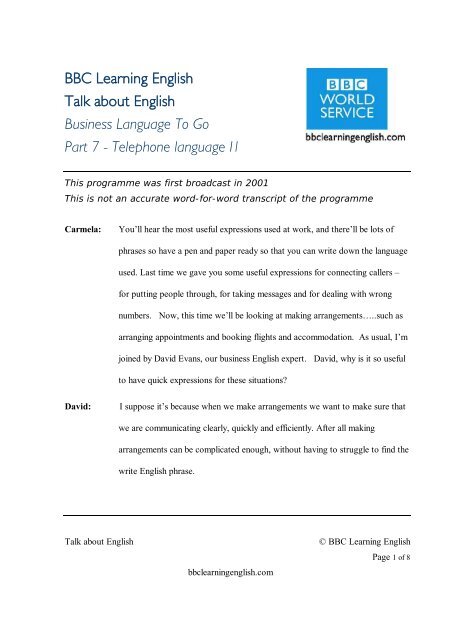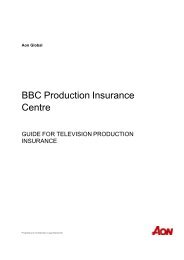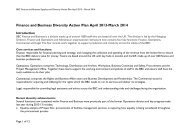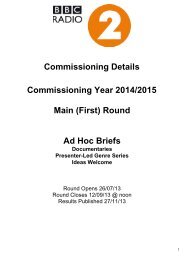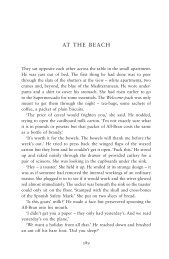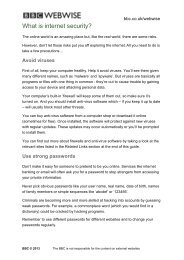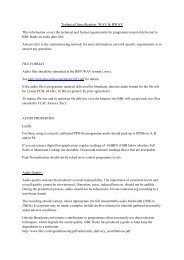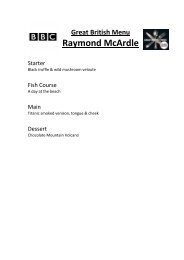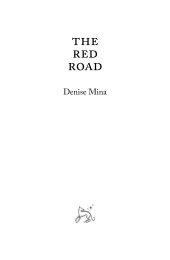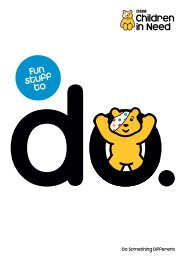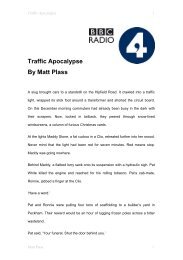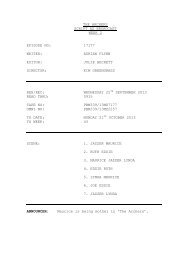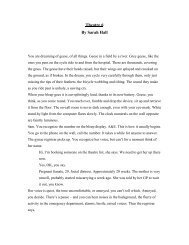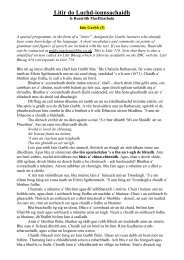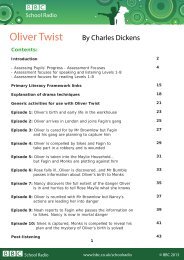Buisness Language to Go - BBC
Buisness Language to Go - BBC
Buisness Language to Go - BBC
You also want an ePaper? Increase the reach of your titles
YUMPU automatically turns print PDFs into web optimized ePapers that Google loves.
<strong>BBC</strong> Learning English<br />
Talk about English<br />
Business <strong>Language</strong> To <strong>Go</strong><br />
Part 7 - Telephone language I1<br />
This programme was first broadcast in 2001<br />
This is not an accurate word-for-word transcript of the programme<br />
Carmela:<br />
You’ll hear the most useful expressions used at work, and there’ll be lots of<br />
phrases so have a pen and paper ready so that you can write down the language<br />
used. Last time we gave you some useful expressions for connecting callers –<br />
for putting people through, for taking messages and for dealing with wrong<br />
numbers. Now, this time we’ll be looking at making arrangements…..such as<br />
arranging appointments and booking flights and accommodation. As usual, I’m<br />
joined by David Evans, our business English expert. David, why is it so useful<br />
<strong>to</strong> have quick expressions for these situations?<br />
David:<br />
I suppose it’s because when we make arrangements we want <strong>to</strong> make sure that<br />
we are communicating clearly, quickly and efficiently. After all making<br />
arrangements can be complicated enough, without having <strong>to</strong> struggle <strong>to</strong> find the<br />
write English phrase.<br />
Talk about English<br />
bbclearningenglish.com<br />
© <strong>BBC</strong> Learning English<br />
Page 1 of 8
Carmela:<br />
Well, let’s have a listen <strong>to</strong> the right English phrases now in the following<br />
telephone conversation. Someone wants <strong>to</strong> make an appointment – do they<br />
succeed?<br />
CLIP<br />
David:<br />
Education Department.<br />
Rachel:<br />
David:<br />
Rachel:<br />
David:<br />
Rachel:<br />
David:<br />
Rachel:<br />
Hi David, it’s Rachel. Can I speak <strong>to</strong> Jenny please?<br />
Oh, hi Rachel, I’m sorry she’s on the other line right now, can I help?<br />
Well actually I’m phoning <strong>to</strong> arrange an appointment. She wanted <strong>to</strong> see<br />
me about the schools project - <strong>to</strong>wards the end of this week, I think she said.<br />
Okay, let me see … (consults the diary) .how about Thursday morning?<br />
I can’t make it in the morning, I’m afraid. I’m over at the other site. Can<br />
Jenny do the afternoon?<br />
No, she’s got a meeting for most of the afternoon. What about Friday then?<br />
Sure. Some time in the morning?<br />
David: Yes, I think the best time would be about 11.<br />
Rachel:<br />
David:<br />
Rachel:<br />
Fine by me. So 11am this Friday.<br />
It’s in the diary Rachel. See you then!<br />
Will do. Thanks David, bye!<br />
END OF CLIP<br />
Carmela:<br />
Well the appointment’s finally made, but only after a lot of discussion! David,<br />
can you tell us about the phrases that the caller used <strong>to</strong> explain why they were<br />
making the phone call?<br />
Talk about English<br />
bbclearningenglish.com<br />
© <strong>BBC</strong> Learning English<br />
Page 2 of 8
David:<br />
Right at the beginning, the caller said, I’m phoning <strong>to</strong> arrange an<br />
appointment….Now the first half of that sentence is a very useful phrase - I’m<br />
phoning <strong>to</strong> ….you can use it in all sorts of contexts. I’m phoning <strong>to</strong> enquire<br />
about something, I’m phoning <strong>to</strong> book a hotel room and in this case of<br />
course I’m phoning <strong>to</strong> arrange an appointment. Arrange is a verb you’ll<br />
often hear in this type of situation. You can arrange an appointment or arrange a<br />
meeting. Anytime where two or more people come <strong>to</strong>gether arrange is a very<br />
useful verb for you.<br />
Carmela:<br />
And then when they were discussing possible times for the appointment, they<br />
used some short phrases – what were they?<br />
David:<br />
Short phrases <strong>to</strong> suggest the times or suggest the date. We heard two of them,<br />
How about? and What about? We heard the suggestion How about<br />
Thursday morning? and then later the secretary said What about Friday? We<br />
also heard the expression I can’t make it meaning it’s not possible for me <strong>to</strong> go<br />
<strong>to</strong> a meeting on that day. Make it again is used a lot when we’re talking about<br />
arrangements…. I can make it on Tuesday meaning it is possible for <strong>to</strong> go on<br />
Tuesday. I can’t make it on Thursday meaning that it’s not.<br />
Carmela:<br />
Let’s hear another telephone conversation now. This one is slightly more<br />
formal than the last one but is the language similar?<br />
Talk about English<br />
bbclearningenglish.com<br />
© <strong>BBC</strong> Learning English<br />
Page 3 of 8
CLIP<br />
Michelle:<br />
Peter:<br />
Michelle:<br />
Peter:<br />
Michelle:<br />
Peter:<br />
Michelle:<br />
Peter:<br />
Michelle:<br />
Mr Hibberd’s office<br />
Hello, can I speak <strong>to</strong> Brian Hibberd, please?<br />
I’m afraid he’s in a meeting until lunchtime. Can I take a message?<br />
Well I’d like <strong>to</strong> arrange an appointment <strong>to</strong> see him, please. It’s Peter Jefferson<br />
here.<br />
Could you hold on for a minute Mr Jefferson. I’ll just look in the diary. (pause,<br />
rustle). So when’s convenient for you?<br />
Some time next week if possible. I gather he’s away the following week.<br />
Yes, that’s right, he’s on holiday for a fortnight.<br />
Well, I need <strong>to</strong> see him before he goes away. So would next Wednesday be<br />
okay?<br />
Wednesday …let me see … he’s out of the office all morning. But he’s free in<br />
the afternoon, after about 3.<br />
Peter: 3 o’clock is difficult. But I could make it after 4.<br />
Michelle:<br />
Peter:<br />
Michelle:<br />
So shall we say 4.15 next Wednesday, in Mr Hibberd’s office?<br />
Yes, that sounds fine. Thanks very much<br />
OK then, bye.<br />
END OF CLIP<br />
Carmela:<br />
Well a slightly more formal telephone conversation but yes, some of the<br />
language was quite similar. David, could you pick out some of the useful<br />
phrases that we heard?<br />
David:<br />
Again we heard another phrase for suggesting a date. We heard Would next<br />
Wednesday be okay? And we heard that expression make it again …I could<br />
Talk about English<br />
bbclearningenglish.com<br />
© <strong>BBC</strong> Learning English<br />
Page 4 of 8
make it after four.<br />
Carmela:<br />
Now, something else we often have <strong>to</strong> do on the telephone is book flights, book<br />
accommodation, especially if we have a meeting out of <strong>to</strong>wn or a conference <strong>to</strong><br />
attend somewhere. During this next phone conversation listen out for some of<br />
those important phrases that will help you book and arrange what you need <strong>to</strong>.<br />
CLIP<br />
Dolores:<br />
Tim:<br />
Dolores:<br />
Tim:<br />
Dolores:<br />
Tim:<br />
Dolores:<br />
Tim:<br />
Dolores<br />
Tim:<br />
Dolores:<br />
Tim:<br />
Dolores:<br />
Hello! Dolores speaking!<br />
Ah, yes, hello. I’d like <strong>to</strong> enquire about flights <strong>to</strong> Hong Kong from Kennedy<br />
airport in New York, please. I’m off <strong>to</strong> a conference at the end of the month -<br />
Thursday 22nd until Tuesday 27th. Could you tell me about the flight<br />
availability and prices?<br />
Certainly, do you want <strong>to</strong> go economy, business or first class?<br />
Well I’d like <strong>to</strong> go first class, but unfortunately I’ll have <strong>to</strong> go economy,<br />
company rules, you see.<br />
(laughs) Yes, sure, I understand. How many of you will be travelling?<br />
Ah, It’s just me.<br />
Okay so that’s one seat … economy … New York - Kennedy <strong>to</strong> Hong Kong<br />
airport …tap tap tap… .<br />
And, how much will that be?<br />
Let me see …. <strong>to</strong> qualify for the discount rate, you need <strong>to</strong> stay over a<br />
Saturday, which you are doing ….. yes, that’ll be $830.<br />
Right, and does that include airport tax?<br />
No, tax is another $70 on <strong>to</strong>p of that.<br />
Okay. Can I book that then?<br />
Certainly …… tap tap tap<br />
END OF CLIP<br />
Talk about English<br />
bbclearningenglish.com<br />
© <strong>BBC</strong> Learning English<br />
Page 5 of 8
Carmela<br />
David<br />
So what expressions did the caller use there?<br />
Well again the caller began by explaining why they were making the call. I’d<br />
like <strong>to</strong> enquire about flights? He could easily also have said I’m phoning <strong>to</strong><br />
enquire about flights. He then went on and asked his first question, Could you<br />
tell me about flight availbility? Again a useful phrase that - could you tell me<br />
about….Then <strong>to</strong>wards the end of the conversation he wanted <strong>to</strong> check whether<br />
there were any extras in the price and he used the expression does that include<br />
airport tax? Again when your checking prices, very useful phrase - does that<br />
include…?<br />
Carmela:<br />
Well the caller needed more information - this time about hotel rooms. Let’s go<br />
back <strong>to</strong> that same conversation and listen <strong>to</strong> the phrases he uses <strong>to</strong> book a hotel<br />
room.<br />
CLIP<br />
Dolores:<br />
Tim:<br />
Dolores:<br />
Tim:<br />
Dolores:<br />
Tim:<br />
And, can I help you with anything else?<br />
Yes, I’d like <strong>to</strong> book a hotel room <strong>to</strong>o for the full 5 nights. Could you check<br />
if the Regency Hotel has any rooms free?<br />
Yes, they do.<br />
And is there a discount rate for conference delegates?<br />
Yes, there is. I think it’s 10% but I can check that for you.<br />
Okay, do you mind if I book it provisionally for now, and I’ll call you back later<br />
<strong>to</strong> confirm. I just need <strong>to</strong> check one or two details.<br />
Talk about English<br />
bbclearningenglish.com<br />
© <strong>BBC</strong> Learning English<br />
Page 6 of 8
Dolores:<br />
Tim:<br />
That’s fine sir. Can I help you with anything else?<br />
No, that’s all for now. As I said, I’ll call you back!<br />
END OF CLIP<br />
Carmela<br />
The caller wants a lot of information about the hotel, about prices. Now<br />
David, can you isolate some of the phrases that he uses <strong>to</strong> get the information<br />
quickly and easily?<br />
David<br />
Again, first of all he explains exactly what he wants using the phrase I’d like <strong>to</strong>,<br />
I’d like <strong>to</strong> book a hotel room. He then enquires about the price, using the<br />
expression is there a discount? In other words he’s trying <strong>to</strong> find out if he can<br />
get a lower reduced price for the room. Is there a discount is a phrase you can<br />
use in many different situations. In a shop you might say is there a discount for<br />
cash? for example.<br />
Carmela<br />
And it’s useful <strong>to</strong> be able <strong>to</strong> reserve something but not actually commit yourself<br />
<strong>to</strong> it. How did the caller make that arrangement?<br />
David<br />
The phrase he used was would you mind if I book that room provisionally<br />
and then call back later <strong>to</strong> confirm? Now, what he means by that is it’s not a<br />
definite, fixed, firm booking. Would you mind if I book that room<br />
provisionally? So the receptionist will write it down but it’s not a fixed<br />
Talk about English<br />
bbclearningenglish.com<br />
© <strong>BBC</strong> Learning English<br />
Page 7 of 8
ooking because he’s going <strong>to</strong> call back, he’s going <strong>to</strong> call again <strong>to</strong> confirm that<br />
he really wants the room.<br />
Carmela<br />
Let’s have another quick listen <strong>to</strong> those phrases. Is there a discount, book<br />
provisionally and confirm later….<br />
CLIP<br />
Tim:<br />
Dolores:<br />
Tim:<br />
Dolores:<br />
Tim:<br />
And is there a discount rate for conference delegates?<br />
Yes, there is. I think it’s 10 percent but I can check that for you.<br />
Okay, do you mind if I book it provisionally for now and I’ll call you back<br />
later <strong>to</strong> confirm. I just need <strong>to</strong> check one or two details.<br />
That’s fine sir. Can I help you with anything else?<br />
No, that’s all for now. As I said, I’ll call you back.<br />
END OF CLIP<br />
Carmela<br />
OK, thanks David. And, just <strong>to</strong> say that David Evans will be joining me next<br />
time for more Business <strong>Language</strong> <strong>to</strong> <strong>Go</strong>.<br />
Talk about English<br />
bbclearningenglish.com<br />
© <strong>BBC</strong> Learning English<br />
Page 8 of 8


